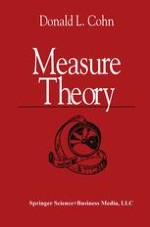1980 | Buch
Über dieses Buch
Intended as a self-contained introduction to measure theory, this textbook also includes a comprehensive treatment of integration on locally compact Hausdorff spaces, the analytic and Borel subsets of Polish spaces, and Haar measures on locally compact groups.
Measure Theory provides a solid background for study in both harmonic analysis and probability theory and is an excellent resource for advanced undergraduate and graduate students in mathematics. The prerequisites for this book are courses in topology and analysis.
Anzeige
